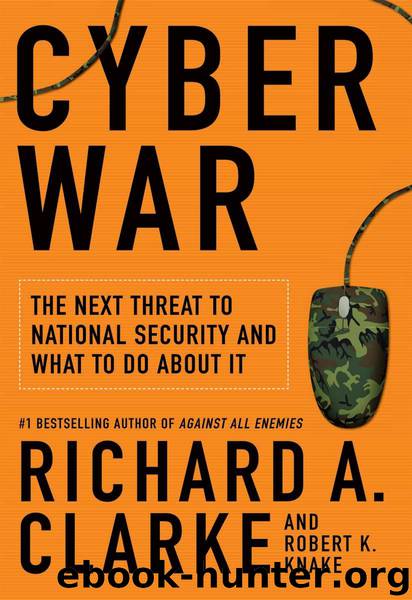Cyber War by Richard A. Clarke

Author:Richard A. Clarke
Language: eng
Format: mobi, epub
ISBN: 9780061992391
Publisher: HarperCollins
Published: 2010-08-09T10:00:00+00:00
OVERALL CYBER WAR STRENGTH
Nation: U.S.
Cyber Offense: 8
Cyber Dependence: 2
Cyber Defense: 1
Total: 11
Nation: Russia
Cyber Offense: 7
Cyber Dependence: 5
Cyber Defense: 4
Total: 16
Nation: China
Cyber Offense: 5
Cyber Dependence: 4
Cyber Defense: 6
Total: 15
Nation: Iran
Cyber Offense: 4
Cyber Dependence: 5
Cyber Defense: 3
Total: 12
Nation: North Korea
Cyber Offense: 2
Cyber Dependence: 9
Cyber Defense: 7
Total: 18
The results are revelatory. China has a high “defense” score, in part because it has plans and capability to disconnect the entire nation’s networks from the rest of cyberspace. The U.S., by contrast, has neither the plans nor the capability to do that because the cyber connections into the U.S. are privately owned and operated. China can limit cyberspace utilization in a crisis by disconnecting nonessential users. The U.S. cannot. North Korea gets a high score for both “defense” and “lack of dependence.” North Korea can sever its limited connection to cyberspace even more easily and effectively than China can. Moreover, North Korea has so few systems dependent upon cyberspace that a major cyber war attack on North Korea would cause almost no damage. Remember that cyber dependence is not about the percentage of homes with broadband or the per capita number of smart phones; it’s about the extent to which critical infrastructures (electric power, rails, pipelines, supply chains) are dependent upon networked systems and have no real backup.
When you think about “defense” capability and “lack of dependence” together, many nations score far better than the U.S. Their ability to survive a cyber war, with lower costs, compared to what would happen to the U.S., creates a “cyber war gap.” They can use cyber war against us and do great damage, while at the same time they may be able to withstand a U.S. cyber war response. The existence of that “cyber war gap” may tempt some nation to attack the United States. Closing that gap should be the highest priority of U.S. cyber warriors. Improving our offensive capability does not close the gap. It is impossible to reduce our dependence on networked systems at this point. Hence, the only way we can close the gap, the only way we can improve our overall Cyber War Strength score, is to improve our defenses. Let’s take a look at how we might do that.
Download
This site does not store any files on its server. We only index and link to content provided by other sites. Please contact the content providers to delete copyright contents if any and email us, we'll remove relevant links or contents immediately.
| Cryptography | Encryption |
| Hacking | Network Security |
| Privacy & Online Safety | Security Certifications |
| Viruses |
Effective Threat Investigation for SOC Analysts by Yahia Mostafa;(7478)
Practical Memory Forensics by Svetlana Ostrovskaya & Oleg Skulkin(7198)
Machine Learning Security Principles by John Paul Mueller(7157)
Attacking and Exploiting Modern Web Applications by Simone Onofri & Donato Onofri(6829)
Operationalizing Threat Intelligence by Kyle Wilhoit & Joseph Opacki(6794)
Solidity Programming Essentials by Ritesh Modi(4582)
Microsoft 365 Security, Compliance, and Identity Administration by Peter Rising(4177)
Operationalizing Threat Intelligence by Joseph Opacki Kyle Wilhoit(3925)
Learn Computer Forensics - Second Edition by William Oettinger(3672)
Building a Next-Gen SOC with IBM QRadar: Accelerate your security operations and detect cyber threats effectively by Ashish M Kothekar(3659)
Future Crimes by Marc Goodman(3587)
Blockchain Basics by Daniel Drescher(3571)
Mastering Azure Security by Mustafa Toroman and Tom Janetscheck(3538)
Mastering Python for Networking and Security by José Manuel Ortega(3492)
Incident Response with Threat Intelligence by Roberto Martínez(3408)
The Code Book by Simon Singh(3167)
Mastering Bitcoin: Programming the Open Blockchain by Andreas M. Antonopoulos(3032)
Mobile App Reverse Engineering by Abhinav Mishra(2995)
From CIA to APT: An Introduction to Cyber Security by Edward G. Amoroso & Matthew E. Amoroso(2903)
